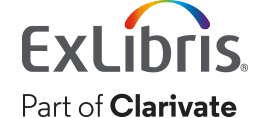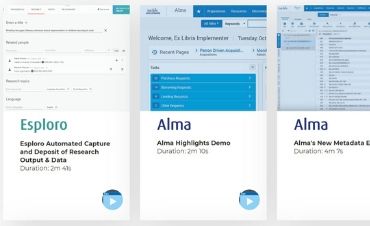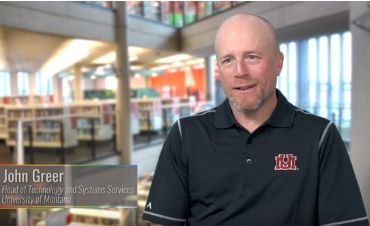Mary-Lynn Bragg, Director of Campus Engagement, Ex Libris
In the last session of the EDUCAUSE Learning Initiative (ELI) conference it became clear just how much education is changing for students in our higher education institutions. Maya Georgieva, Director of Digital Learning at The New School, one of the expert panel for the preview release of the much-anticipated Horizon Report, told us about the XReality Project at her university. There, they have created a virtual experience with the fashion design program, a partnership not initially obvious. As Maya Georgieva stated, “It’s not what you know; it’s what you create with what you know.” Dozens of people took pen to paper and fingers to Twitter to capture that phrase because it so aptly summed up what we’d seen over those few days. Education, and the production of knowledge, like everything now, is all about group work – putting everyone in charge of creating the experience as it happens. For students, the stakes attached to these experiences are very high and their expectations are as well.
The EDUCAUSE Learning Initiative (ELI) annual conference is where people passionate about the experience students have with technology in their classrooms come to learn and share with their peers. Working closely with Ex Libris customers, including many libraries who look for new ways to partner with their faculty, it was a great place for me to explore big ideas and have access to this external academic viewpoint.

It’s not what you know; it’s what you create with what you know.![]()
The Student Experience, Analytics and Privacy
Student success and “the student experience” were part of every session regardless of the advertised topic. I attended a session on learning analytics (Learning Analytics and Privacy: Practice Implications for Higher Education) that quickly centered itself on what we owed to our students: maintaining their privacy, making it clear what data was being gathered and shared by the school and for what purposes, and allowing opt-out options that are understandable. We may take it for granted that the purposes of collecting this information are benign at worst and beneficial to students at best, but we should still challenge this thinking—do we really know what we’re creating with what we know? Learning analytics has been a hot topic around EDUCAUSE for some time, but no one seems to be very sure what beneficial outcomes are really guaranteed by all this data gathering and parsing. Concerns remain that it could quickly get out of hand, but also that we operate in a world were passive data collection is just part of doing business. As a fellow session-goer pointed out “Being better than Facebook is hardly a high bar.”
Preparing for Lifelong Learning
The 60-Year Curriculum: Ideas, Strategies and Changes introduced me to the name for something that has been obvious for some time: you need to prepare yourself to learn throughout your life. Estimating that students now will have three careers and thirty jobs in their working life is a new stat to me but then, I’m old: “kids these days” are entrepreneurial and it doesn’t surprise me that they’d face this world of non-stop change with much more ease that I’d personally imagine. They will need support and the academy may not be ready: so much of higher education fixates on producing students who are in specific job-or-career-ready states. Students need and want to emerge from their years in college ready to step directly into their chosen field and their fields want them job-ready. Industry-academy partnerships are geared up for this pipeline, often driving specifics in the curriculum. But where does this leave students in ten or twenty years – have they been set up to be adaptable, to learn on the job, to learn ahead of the job they’ll need to get next? I’m not sure.
One of the downsides of ELI conference sessions is that they aren’t long enough to get into any topic in much depth, particularly when the topic involves multiple challenges. In this session, instead of a discussion focused forward on the time after graduation, as was originally intended, the conversation instead turned to the challenges that lie in what preparation students have for higher education (consensus: not as much as they should) and that we need to connect back to K-12. How can we prepare students for the next 60 years when we can barely get them out the door in two or four?
Partnering with the Library
Anything that has a librarian involved gets my attention. The work of librarians was well represented, but I always wish there were more librarian-centered sessions. At Engaged Faculty, Student Success, and $1M in Savings, attendees heard about how the George Fox library partners with instructional technology staff—a winning combination on any campus! —to manage their successful Open Educational Resources (OER) program. In this case, the library has created a program to work with faculty on replacing high-cost textbooks with open textbooks and library e-books. This hybrid approach gives faculty flexibility in meeting pedagogical needs while still focusing on the primary goal: giving students free access to the materials they need on day one. This model that mixes OER with library collections is one we’ve seen used successfully by Ex Libris Leganto customers as well.
Working Together
Poster sessions, as always, were where a lot of the action happened – and where exciting pilot projects and experiments were showcased. Key themes centered around how to create and use campus physical spaces better; virtual learning (VR, augmented and mixed reality); and methods to improve diversity and inclusion. In all cases, the path to success for these projects involves bringing many campus roles and groups together. Again, group work prevails!
Technology and Education
Conferences provide us with new ideas and fresh perspectives, a chance to showcase the work we’re engaged in for appreciative peers, and of course the opportunity to meet new people who share a common set of challenges and values. It’s easy in higher-ed to feel like what’s in front of you is too big and to have a hard time grasping how to turn these large ships around so that they can move in a direction that keeps pace with the new waves of students and their changing needs. Educational technology is still technology after all, with its “move fast, fail fast, keep moving” ethos, but education is still (forgive me) “old school” – it still needs to fulfill basic needs and is occupied by traditional thinking much of the time. It would be easy to get frustrated working at the intersection of technology and education, but while I saw and heard a lot of skepticism, it never turned cynical. These are people who do care deeply, as we do here at Ex Libris, about examining and improving the student experience. We’re all creating with what we know.
March 4, 2019






